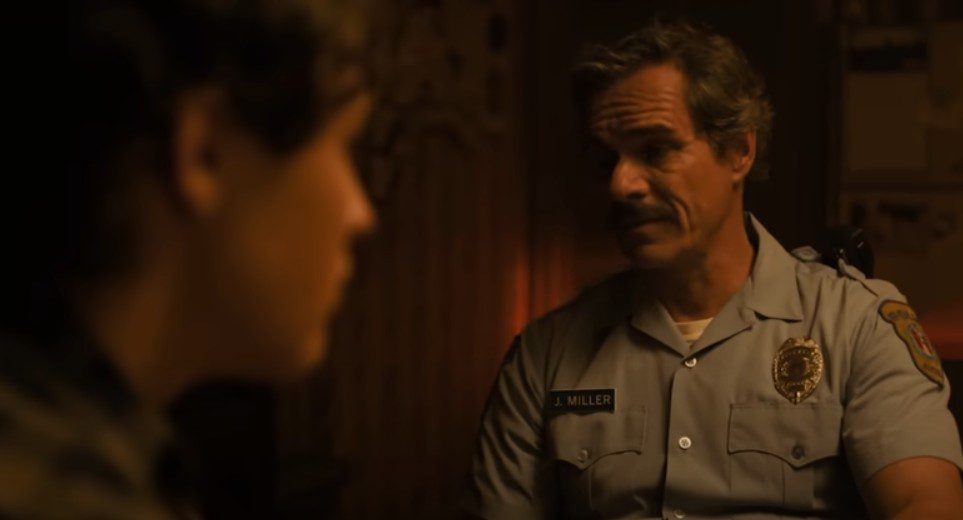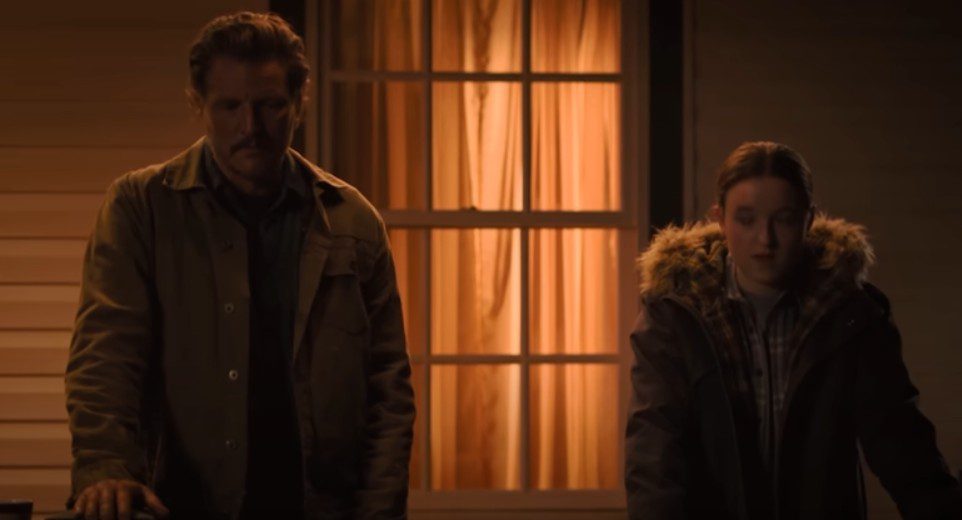I have bad news for anyone hoping that the ending of last week’s episode of The Last of Us was confirmation that everything was a dream, as Joel’s appearance right before rolling credits was not a gleeful surprise that he is alive. Rather, it was the kickoff for this week’s nostalgia-laden episode, taking us back to temporarily happier times when Joel and Ellie got along, and showing the degradation of their relationship over the years leading up to the start of season 2.
The aptly-named “The Price” served as a farewell to a beloved character, a needed bit of context, and, unfortunately for this fan, features the moment where The Last of Us has lost me.

This is a great episode on so many levels, one that for the most part gives the audience the very best version of The Last of Us, with the characters everyone loves in scenes that are astoundingly well directed and acted. Here is the full muscle of the HBO production machine working overtime to give fans an hour of cinematic excellence that defines the brand. It was deserved, as this likely serves as the farewell episode for Pedro Pascal as Joel Miller.
The choice of how to handle the flashback sequences from The Last of Us Part II has been a topic of debate from the second the show existed, as they are one of the more complicated issues with adapting the story. The decision to pack them all into one episode makes sense. Rather than teases of singular scenes spread throughout the story, you get one last indulgent meal of Joel and Ellie to gorge yourself on before saying goodbye forever. It also gives Pedro Pascal that one last episode to remind everyone why he is a perfect Joel Miller.
And he most definitely reminded everyone of this fact. Pascal completely owns this episode, throwing his full, immense talent into a variety of scenes displaying every facet of Joel, good and bad.
Frankly, this reminder of Joel made the absence left in the story by his death all the more keen, for reasons serving the larger season and also detracting from it. This is the man Ellie and Dina are in Seattle for, the looming void in Ellie’s life that she is struggling to cope with. Seeing Joel again is a brutal reminder to the audience of who Ellie has lost.
Unfortunately, it is also a bit of a reminder of who the audience has lost. A big reason why The Last of Us Part II works for some and not others is because some people were on board with Ellie fully taking the reigns after Joel’s death, while others were not. Some people looked at The Last of Us as Joel and Ellie’s story, and without him they lost the appeal that attracted them to the franchise.
I imagine the same will be even more true, and more divisive, about this season’s version of events. I know it is for me. I had no problem with Ellie stepping into the full playable character role in the game, as she was easily compelling enough on her own. I do not feel the same way about Ellie in the show, and seeing Joel again is a reminder of the kind of character and presence that this season has sorely lacked. No one has been able to fill the hole left behind by Joel Miller’s death.
When you see this man completely dominate every scene he’s in, easily taking the lead and allowing Bella Ramsey’s Ellie to play off him, it reminds me of everything that was good about season 1 that jut hasn’t been here in season 2. Isabela Merced has the talent, but her Dina is stuck in this awkward place between being an adapted side character that has to compliment Ellie, but, because of the additions to her character, largely overshadows her. Ellie should be that character promoted in Joel’s place but has largely been kept from rising to the occasion by plotting choices.
Unfortunately, there is no one else to take up that mantle this season.
Placing a dedicated flashback episode right before the finale is also a risk, when all the momentum of Ellie murdering Nora is in place. “The Price” kind of brings that to a screeching halt. Perhaps it was necessary, as a reminder of the Ellie we used to know and a chance to take a breath before the unavoidably gruesome nature of the finale. People often criticize The Last of Us Part II as being too much all the time, and giving us a little Joel and Ellie happiness, despite the growing anger and tension between them throughout the episode, gives us all a moment’s respite and avoids that criticism.
Still, in a seven-episode season that already feels far too short, it’s something of a shame to spend an entire episode just on past events that could have been spread throughout the entire season.
It’s hard to be too critical when the scenes are so good, though. “The Price” makes losing yourself in the wonderful dynamic between Joel and Ellie so easy, whether they are on good terms or not. There’s nothing you can objectively watch in any scene and call bad. The acting, the dialogue, the direction — everything is executed at the highest levels.
People are going to love this one. They should love this one. All reservations aside, The Last of Us gave audiences one hell of a collection of scenes to enjoy for an hour, and I was no different. I expected to walk away from this one asking if the episode was necessary, but not caring enough to criticize too much.
Then the porch scene happened.

I’ll be frank, there is no way for me to discuss this without going full game snob, and everyone’s tolerance for that will vary, but the porch scene was a gigantic misstep. One that shocked me on multiple levels. Flat out, it is a scene that has me questioning whether I will watch season 3 of The Last of Us.
For context, the porch scene is basically the final scene of the game, placed as such for context I won’t get into here, but if you know, you know. Placing it here is weird enough, without the structure and context that made the scene so memorable in the game. I have reservations but maybe it’s fine, I can get over that.
Then “The Price” did something shockingly unfathomable to me. They combined the porch scene with the game’s confession scene.
Again, for context, Joel’s confession about the Fireflies does not happen here in the game. It happens 2 years earlier, when Ellie rides alone back to the Salt Lake hospital to investigate Joel’s claims. She finds proof he lied, and when Joel catches up to her, she delivers the ultimatum she does in the show, where Joel either tells the truth or loses her forever, and Joel finally admits to killing everyone to rescue her.
It is so, so important for these scenes to be different scenes separated by so much time. This is why Ellie feels so much hostility towards Joel and their relationship is strained before the dance. This is why the porch scene is necessary to begin with. These are two characters who care deeply about each other but have been sundered by their reactions to their trauma, and miss out on years together because of it. Joel took away what Ellie believed to be her purpose in life. The reason for living she clung to after Riley’s death as the larger purpose for her continued survival.
Condensing these two moments so that Ellie is willing to try and forgive Joel mere seconds after he confesses completely undermines the confession, as well as Ellie’s anger. Trying to make Eugene’s death a sort of replacement for Joel’s confession, as the thing that causes Ellie and Joel’s relationship to turn from tense to outright hostile, is wholly inadequate. It should have been the scene that led to the confession minutes later, so the show at least had that anger in place for the months before the dance and the porch scene.
No, it doesn’t make a difference that Ellie had such strong suspicions beforehand. That’s not the point. That’s not the problem here. She knew in the game as well, and still needed two years before she could begin to move past her anger. As Gail said earlier this season, you need to tell the truth before you can be forgiven.
Joel’s confession isn’t about “finding out” what he did. It’s about stripping any doubt or hope Ellie had about the situation, leaving only the raw, painful wound Ellie feels over Joel betraying her that way. It’s a wound that Ellie should not be considering moving past 15 seconds after Joel tears it open. It’s a hard truth that Ellie needs time to cope with before she can remember why she loves Joel.
Ellie being able to hold on to that anger for so long is why she is the type of person to drop everything and go to Seattle to hunt down Joel’s killers. It is why this story eventually goes in the directions it does, at the expense of so much Ellie holds dear. Now, because of that choice, Ellie is no longer that person, and the whole plot starts to crumble when she is no longer that person.
Combining these scenes is an unfathomably bad adaptational choice, on par with something like Game of Thrones cutting Jaime’s confession to Tyrion about Tysha. This is the kind of choice that completely softens and undermines the entire story being told, to the point I’m shocked Neil Druckmann is okay with it.
I’ve had a growing dissatisfaction with season 2 of The Last of Us for weeks now, and this was a tipping point I likely won’t come back from.
I know this is objectively good TV on many levels. There is no way I would call The Last of Us bad TV that you should feel bad for watching and enjoy. For those who love it, I am happy for them. I also cannot pretend to be anything other than a huge fan of the games who is heartbroken over how much I dislike the adaptational choices made for season 2. The porch scene was the final straw, the moment that is ultimately pushing me away from this show.
It’s far from the first or last time an adaptation will disappoint me, but The Last of Us hurts more than most of them.
Images Courtesy of HBO
Have strong thoughts about this piece you need to share? Or maybe there’s something else on your mind you’re wanting to talk about with fellow Fandomentals? Head on over to our Community server to join in the conversation!

